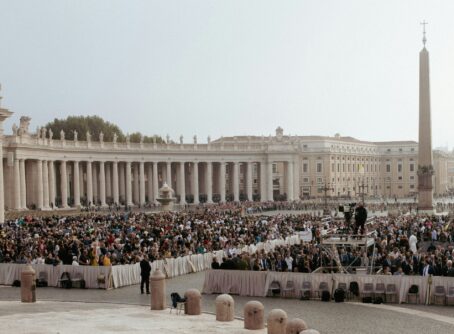
The case Loffman v. California Department of Education centers on a beautiful idea: Orthodox Jewish families with children with disabilities want to send their children to Orthodox Jewish schools that welcome and accommodate their holistic spiritual, developmental, and academic needs. Unfortunately, in California, policymakers have denied access to federal and state education funds for faith-based educational institutions and families. In California, the law bars religious families from accessing special education funds for their disabled children and prevents religious schools from accommodating these students. In the Los Angeles region, a community of Jewish families recently urged the 9th. U.S. Circuit Court of Appeals to invalidate the California law. In the summer of 2023, a federal district court based in Los Angeles disregarded previous Supreme Court precedent (Carson v. Mankin and Fulton v. City of Philadelphia) that upheld the religious freedom of faith-based schools and families. As a result, the court denied special education funds to the faith-based schools these Orthodox Jewish families believed could best meet the needs of their children.
Institutional Religious Freedom for Families and Schools Meeting the Needs of Children with Disabilities
The Individuals with Disabilities Education Act (IDEA), a federal law, upholds the notion that disabled children should have access to an education that addresses their distinct needs. IDEA, crafted to make sure all children can access a free and appropriate education, offers grants to states. These grants cover expenses such as professional development, special education programs, assistive technology, and other services. California, like other states, supplements federal IDEA funding with its own for special education. However, in California, politicians exclude religious schools and the religious families they aim to serve from even applying for this funding when public schools cannot meet their needs.
Under IDEA, students can be placed in private schools meeting their needs when public schools cannot offer suitable education. However, in California, religious parents and schools are barred from accessing federal and state special education funding and services. Despite non-religious private schools being eligible and a recent poll revealing public dissatisfaction with California’s public schools’ support for disabled children, parents do not even have the option of sending their children to faith-based educational institutions.
Further, faith-based schools aren’t capable of fully supporting all students with disabilities in their communities since the communities themselves are often under-resourced. The result of this is that many religiously observant families in California are unable to educate their children in the way they believe is best for them. It is also worth noting that children from lower-income families are disproportionately affected, as households living below the poverty line are more likely to have a child with a disability.
This is deeply troubling, because it denies the full unfolding of human dignity of every child and family. It also denies the full unfolding of the capacity of distinctive institutions to meet the distinctive needs of those children and families. As Becket Law has stated: “Chaya and Yoni Loffman, Fedora Nick and Morris Taxon, and Sarah and Ariel Perets are Orthodox Jewish parents who want to send their children with disabilities to schools that provide an education that allows them to reach their full potential and that is centered around their Jewish traditions and beliefs.”
While this point is often overlooked, families and schools represent not just groups of people, but also institutions. They cannot realize their complete potential, nor can the individuals within them reach their full capabilities, without the necessary spiritual and religious freedom to live by their unique sacred beliefs and values.
Legal Intervention in California
The Teach Coalition, a program of the Orthodox Union that advances equal access to funds for children in faith-based schools, has recently partnered with Becket Law to make sure that faith-based children with disabilities are not denied special education benefits simply because they are attending faith-based schools. The Teach Coalition has stated: “Every parent should have the right to choose the school that is best for their child….A group of Orthodox Jewish parents…are unable to do so because politicians in California exclude all ‘sectarian’ schools from participating in the State’s funding program.”
As the Opening Brief for appellants Chaya and Jonathan Loffman contends, California’s exclusion of Orthodox Jewish children and schools from equal access to special education benefits solely due to their religious beliefs goes against not only moral principles but also the Constitution. This unconstitutional practice directly contradicts two important decisions of the Supreme Court.
In Carson v. Makin, the Court invalidated Maine’s policy that denied families educational benefits when opting for religious schools. It stated that penalizing religious families or schools for their beliefs violates the Free Exercise Clause. However, California mirrors this by refusing certification to religious schools as “non-public schools,” barring them from federally funded special education services based solely on their religious nature.
California’s attempt to argue that private schools aiding disabled children offer a “public education” mirrors Maine’s failed argument. Additionally, California’s own statutes consider placing disabled children in private schools as an “alternative” rather than a variation of public education. Further, as the brief states: “Nor are religious schools transformed into avatars of the State because they must sign contracts with public school districts to be certified as nonpublic schools. California’s exclusion of Jews cannot be reconciled with Carson.”
The brief also argues that California’s policy also conflicts with the Supreme Court’s ruling in Fulton v. City of Philadelphia. According to Fulton, a law that imposes hardships on religious practice and allows discretionary exemptions faces strict scrutiny. Additionally, they failed to show any historical precedent for stopping public funds from going to religious schools. They cannot pass this rigorous test. Carson dismissed the notion that aiding private religious schools conflicts with anti-establishment interests. As the brief states: “There is no historic and substantial tradition against aiding private religious schools in this manner. Nor could categorically excluding religious entities ever be construed as “narrow” tailoring.”
According to a recent poll carried out by Becket, a majority of Americans and Californians both believe that government funding for children with disabilities should be available to the schools that best meet the needs of the students -whether faith-based or secular.
Conclusion
Religious freedom is often dissected into various categories: individual versus institutional, majority versus minority religions, progressive versus conservative beliefs, and even religious versus spiritual perspectives. These divisions often pit one against the other, providing ample ammunition for advocates on both sides to prioritize certain categories, amplifying religious freedom for some while disregarding or outright denying the violations faced by others. These divides permeate all aspects of human life, perpetuated by the divisive cultural environment in which we live. No single group should possess complete control over religious freedom. It’s crucial to acknowledge that there are legitimate and necessary boundaries to many claims of religious freedom in society, which need to be balanced against other significant interests.
Yet, this case highlights how those distinctions, when pitted against one another, often erase those invisible threads of interconnectedness that hold our shared flourishing together. This case shows how religiously conservative communities can and do advance justice for those in their own communities and beyond who are vulnerable, a cause often associated (falsely) solely with the progressive left. This case also shows how institutional and individual religious freedom rights coexist, and, when in the right relationship, are mutually reinforcing, even codependent. The brief makes this powerful statement that reflects the interdependent and inseparable nature of religious freedom and religious education for American Jewish communities: “At Sinai, G-d charged Jews with instructing their children in the faith. And faithfully teaching their children has been essential to Jews ever since. Indeed, Jewish education has been a central part of maintaining religious traditions and upholding religious commitments through centuries of persecution. California cannot force Jewish children to choose between the Jewish education that is their birthright and the governmental special-education assistance they are entitled to as Americans. The Court should reverse.”
Oral argument at the Ninth Circuit is anticipated to occur early in 2024.
Chelsea Langston Bombino is a believer in sacred communities, a wife, and a mother. She serves as a program officer with the Fetzer Institute and a fellow with the Center for Public Justice.





